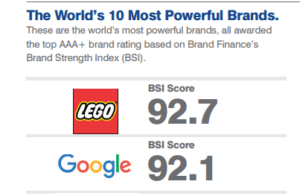News
Lego named most powerful brand in the world
This article is more than 8 years old.
Toy producer retains top position, while Arla and Danske Bank make the top 500 most valuable brands

Sorry Google, there can only be one (photo: Brand Finance)
The Danish toy giant Lego has been named the most powerful brand in the world by the leading brand valuation and strategy consultancy Brand Finance.
Lego retained its position at the top following a brief respite last year, beating out Google, Nike, Ferrari and Visa, and its future continues to look bright.
“The building blocks for Lego’s brand strength have always been present, but the release of ‘The Lego Movie’ in 2014 provided the final push required to make Lego the world’s most powerful brand in 2015,” wrote Brand Finance.
“The first sequel, ‘The Lego Batman Movie’, will be released on February 9. Its predicted impact has helped Lego regain its top position, lost to Disney in 2016. Further planned releases will continue to build the brand for years to come, while contributing significantly to Lego’s already vast licensing income.”
READ MORE: Lego most valuable brand in Denmark
Google beats Apple
Lego also soared in the 2017 valuable brand rankings, from 326 last year to 196 this year. Other Danish companies to make the top 500 were dairy producer Arla, which fell 42 spots to 462 and Danske Bank, which cracked the rankings this year and came in at 488.
The most valuable brand in the world was Google, which relegated last year’s leader, Apple, into second. Amazon.com, AT&T and Microsoft completed the top 5, followed by Samsung Group, Verizon, Walmart, Facebook and ICBC.










































